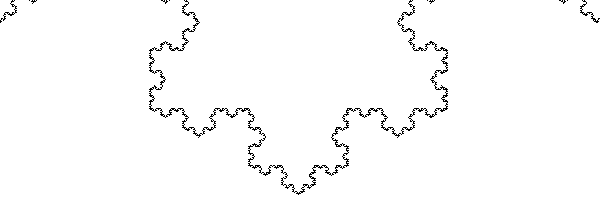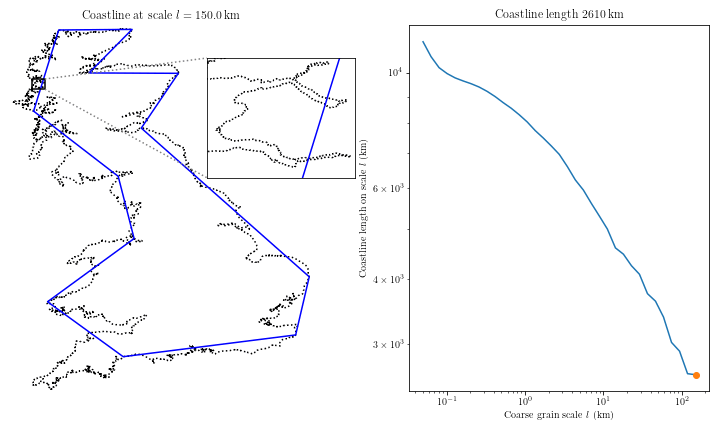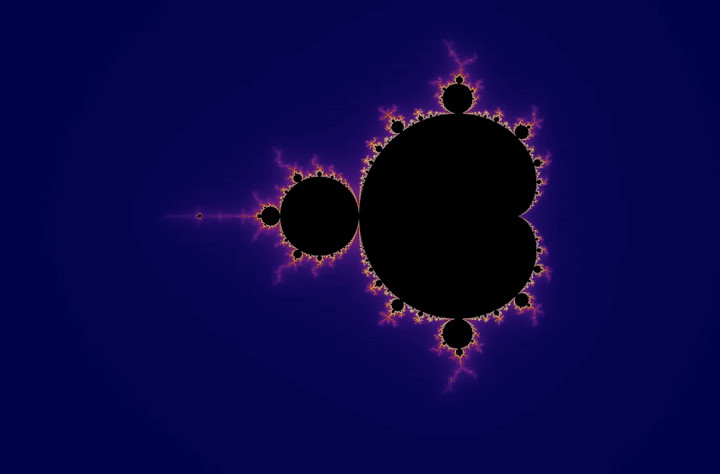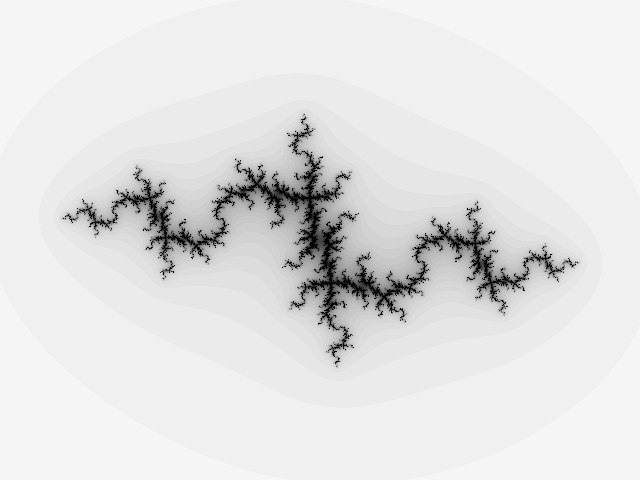A fractal is a way of seeing infinity
— Benoît Mandelbrot
Nothing is built on stone; All is built on sand, but we must build as if the sand were stone.
— Jorge Luis Borges
Can You Measure a Coastline?
In 2006, the Congressional Research Service (CRS) of the United States estimated the coast of Maryland to be 31 miles long. Strangely, the National Oceanic and Atmospheric Administration (NOAA) estimated it to be 3,190 miles long. This staggering difference was not a clerical error. These values were the actual reported measurements from each study of the Maryland coastline. (For more see here)
Maryland's is not the first coast in history that cartographers have separately measured to wildly different lengths. The phenomenon is known as the "Coastline Paradox". When estimating the length of any fractal curve via straight lines, the actual length is indeterminate. Suppose I measured the coastline of Maryland with a yardstick, and you with a foot-long ruler. My answer will be far smaller than yours. Without getting into the math, the smaller your measurement-length, when measuring a fractal curve, the larger the length of that curve will be.
This measurement problem is known as the Richardson Effect and has been studied in detail by Benoît Mandelbrot. Mandelbrot famously described shapes with infinitely embedded and repeating complexity with very simple equations that describe what he called "fractals".
I will not go through the exact definition of a fractal here, but we can simply say for now that a fractal curve is defined as one whose perceived complexity changes with measurement scale.
In Mandelbrot's own words a fractal is, loosely:
a rough or fragmented geometric shape that can be split into parts, each of which is (at least approximately) a reduced-size copy of the whole
When measuring any fractal shape, real or abstract, we face this coastline problem. Part of what it is to measure is to agree on something. It is on the basis of this embedded self-similarity of fractals that the "Coastline Paradox" is claimed to be a "Paradox". It is claimed that a coastline has no real determinate length, yet we can measure it to have some length.
Is there really a paradox here? I think in a trivial sense yes. I argue that real objects that exhibit fractal curves only have a determinate length insofar as we can agree on a measurement schema. Do we stop at the grain of sand? The Angstrom? The inch? The best answer will be determined by our goals, but that does not mean it will always be easily attained. It has been pointed out recently, on account of this goal-based agreement, that perhaps a coastline is not really fractal in the Mandelbrot sense.
A Strange Philosophical Question
My purpose in this note is not mathematical or cartographic. I want to consider the "Coastline Paradox" as a model for our understanding of reality and pose some philosophical questions based on that comparison.
Mandelbrot considered his fractals to be related to a "theory of roughness". The relationship between a fractal edge and our concept of 'roughness' is easy to see in a physical object. Imagine zooming in on an aerial view of a coastline. The closer we get, the more the shape changes, and embedded patterns are revealed that are self-similar to the overall shape (in some sense, perhaps not exactly as in Koch Snowflake GIF at the start of this note).
The philosophical question I want to ask is this: what if our relationship to reality is analogous? What if the deeper we dig into some phenomena or some realms of understanding, the more embedded complexities we discover ad infinitum? This question decomposes into the questions of whether there is some infinite nature to the depth of inquiry and whether that infinite depth would exhibit some self-similarity the deeper it went. I will focus mostly on the question of the potentially infinite depth of inquiry, where depth refers to gaining more knowledge that is not merely about the knowledge that one already has.
I will argue that the answer to the question: "could inquiry could be infinite?" highlights the goal-dependent nature of inquiry and understanding generally and that if there is a Richardson Effect to finding more facts, then goal-dependent and more pragmatist frameworks for metaphysics and epistemology are better ones. Just as the real Coastline "Paradox" resolves when we agree on a measurement criterion, so the philosophical skepticism of how we could know anything or be acquainted with any reality truly if it is in some deep sense fractal can be sidestepped when we share goals in understanding the world.
Clarification
Admittedly, the general philosophical question of this note is, so far, unclear.
What if the relationship of inquiry to reality is fractal, like the relationship of a measured length to a coastline?
Let's clarify it a bit. There are two ways to interpret this question.
- Metaphysical Fractality
Reality IS such that infinitely more detailed descriptions of phenomena will always be true of it.
This would mean that, whether we can know it or not, there is no rock-bottom to inquiry. The more facts we would discover, whether we were to discover them or not, the more other facts there will be to discover. It is important to note that, in order for this thesis to be interesting at all, these additional facts would not merely be "facts about the facts we already have", that is trivially true. The more facts we get, the more facts about facts there are. Fractal 'roughness' is not merely recursion.
Perhaps an example will help this point. Suppose physicists discover -ons (some particle that describes all the other higher-level phenomena we know about) and the behavior of all the other things in the universe now makes sense. But wait! If Metaphysical Fractality is true, then we will likely subsequently discover that -ons are composed of -ons and -ons etc etc and the process of discovery only moves 'downward' infinitely.
- Epistemological Fractality
Our knowledge of reality is (and will be) such that a more detailed account will always avail itself (eventually) whenever a new less detailed one does.
Epistemological Fractality would mean that there is something, perhaps something necessary, about the nature of our knowledge and its relation to the world that makes it never reach able to reach rock-bottom, but always peels back another layer revealing new knowledge infinitely. Again, to be clear, it is trivially true the more knowledge we get, the more knowledge about that knowledge there is. That is not what is meant by Epistemological Fractality.
With either Epistemological Fractality or Metaphysical Fractality being true, a "coastline problem" emerges for our knowledge of the world. If Metaphysical Fractality is true, no matter what the nature of our inquiry is, there will never be an absolute fact that is not an infinite composite of deeper facts. If Epistemological Fractality is true, something about knowledge, but maybe not reality, yields the same effect.
Setting our metaphysical and epistemological baggage down for a minute, these two theories will be identical in most if not all of their predictions. Also, Depending on one's account of truth, these two theories might sound identical altogether. To avoid confusion and stick to the point here I will therefore treat them as the same.
I will cut a lot of philosophical corners here and revise our question to this:
(Again, I will not address the question of self-similarity which is an important feature of fractals)Is either reality itself, or any possible knowledge we could have about it, fractal in nature? Is inquiry of infinite depth?
Perhaps to answer in the affirmative is just to adopt a certain disposition towards inquiry.
Zooming-in animation of the Mandelbrot set by MathigonHow Can We Answer?
How might we answer the above question? Perhaps empirically? We can rephrase our question above as an empirical hypothesis. But is it actually testable? Its infinite nature muddles the meaning of its testability. Alternatively, maybe a rule that we firmly believe in guides us the conclusion that reality is fractal?
Empirically?
Theory: The more we discover about reality, the more there will be to discover about it. (where those new discoveries are not just some recursive description of the already discovered parts)
Suppose, to continue with our mock-physics example, that we continue on to discover -ons, -ons, -ons, and eventually to -ons... -ons.
Reality is fractal We find -ons
Reality only goes as deep as -ons We find -ons
The evidence always confers the same probability, at some observation , on "infinite observations" as it does on " observations". So is it impossible to empirically decide? In the case of adding more observations, yes. However, in the case of observations completely ceasing it seems not. We could imagine a case where we discovered -ons and that just tied everything up. That's it. Understanding is complete at the discovery of the -on. Surely some will find this view absurd, but it is certainly possible unless we take a rather hardline commitment to Epistemological Fractality (or Metaphysical Fractality where we are ignorant of reality for some compelling reason).
If we admit that such a hard stop is possible and if we never observe such a hard stop, which we have not yet, then we have increasing evidence for reality being fractal with each layer of reality we peel back (but we do not have more evidence for it being fractal than for it only going as far as our present depth). This may or may not be significantly dependent on what prior probability we assign to reality being fractal in this way.
A Rule?
The Fibonacci sequence is infinite. How do I know that? I know it because the Fibonacci numbers are the sequence of numbers
where
with , and conventionally defining .
I know the rule to get the next number. Take the last two numbers, add them together and I get the next.
Given , I add and get . It seems that I know that this can never end because I know a rule that, by virtue of my following it, necessarily gives me a new Fibonacci number.
Do we know such a rule for inquiries about reality generally: that they will always give me more facts or more questions left open? I do not think so (again, not in the sense of more 'facts about the facts', for that is trivially true). It seems necessarily true that the Fibonacci sequence will never terminate if I sat down and cranked out numbers for an infinite amount of time. It does not, in any salient way, seem necessarily true that one discovery unearths at least one more. However, if reality's fractality is not necessarily true or false, it follows as a simple truth of modal logic that it is possibly true.
An Answer
Whether some rule would emerge that would conclusively show us that reality is or is not fractal or whether some hard-stop/rock-bottom would be observed that would prove that it is not, at present it seems that we have to accept that it is possible that reality is fractal in the sense suggested above.
The cash-value of believing that reality is possibly fractal with respect to inquiry, is a stance of preparedness for endless complexity and a disregard for the importance of ultimate ontological questions. For, if it is true that reality is possible fractal, then what there is, in reality, has no determinate answer unless we agree on a criterion, as in the coastline problem, for what we care about.
I think this highlights an already common-sense view. Who cares what the 'ultimate truth' of the coastline's length is if we are just trying to sail a boat around the coast of England in some finite amount of time? Who cares what the 'ultimate constituents of reality' are if we are just trying to survive, do good, launch a rocket, cure diseases, do the laundry, help future humans survive and flourish and so on. Only within these inquiries would it be worthwhile and possible to have an agreed on criterion of measurement (supposing reality is of this infinite fractal nature). Once we have such a criterion of measurement we no longer face indeterminacy about the answers.
This subject has in no way been treated with exhaustive clarity here and much more could be said about it. For the time being, I find it a fascinating lens for contemplating our relation to a world that is possibly intractably complex as creatures of finite attentive and computational power.




